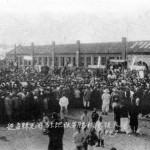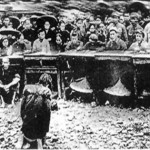
‘Speaking Bitterness’ was a dramatic feature of land redistribution in communist China. In 1950 the Chinese Communist Party (CCP) passed the Agrarian Reform Law, which outlined practical steps toward land reform and redistribution. The party insisted that Speak Bitterness meetings be part of the land reform process. These meetings were modelled on anti-landlord trials held in CCP-held areas in the years before 1949. Speak Bitterness would give Chinese peasant farmers the opportunity to express their anger and sorrow about old injustices. Under the auspices of Speak Bitterness, regional party leaders organised public meetings where landlords or employers were, in effect, placed on public trial. Tenant farmers could attend these ‘people’s courts’ to confront those who had previously exploited and mistreated them. Peasants once wronged by these individuals were encouraged – and in some cases obliged – to step forward, tell their story and expose their ku (past sufferings).
There were very few formal guidelines for these sessions. There was no time limit on testimonies, no formalised process, no cross examination of witnesses and little or no opportunity for accused landlords to bring witnesses or speak on their own behalf. Speak Bitterness sessions could be very long, emotional, dramatic, hostile and one sided. If landlords failed to answer particular questions or were implicated in witness testimony, they were often subjected to insults or beatings. Sometimes denounced landlords were executed at the conclusion of Speak Bitterness meetings, though it was more common for them to be banished or forced into a subservient role. Sometimes Speak Bitterness meetings were more about theatre and ritual humiliation than punishment. American reporter Jack Belden described witnessing one session, its defendant an old man who had starved and mistreated his family. The man was bombarded with insults and drenched with saliva but otherwise unharmed.
The American writer William Hinton, who lived in the village of Long Bow during the months of Speak Bitterness, described one of these sessions in Fanshen, his famous account of the agrarian revolution in China. Hinton refers to two men who were hauled before Speak Bitterness session: Jung Wang, a former landlord, and his brother and business partner. Jung was subsequently stripped of his wealth, while his brother was beaten to death. Here Hinton describes the mood of the village when these men finally had to answer to those they had exploited:
“Then Ho Pang, a militiaman, spoke up. His voice shook as he told how he had rented land from Jung Wang. “One year I could not pay the rent. You took the whole harvest. You took my clothes. You took everything.” He broke down sobbing as a dozen others jumped up shouting “Speak! Yes speak, make him talk. Let’s hear his answers.” But Jung Wang had no answers. He could not utter a word. The next morning when the people met again to carry on the campaign against Jung Wang, excitement ran high. Women even went so far as to bring food with them so that they and their families could stay right through the day and not miss a single minute.”

The process was not always violent and hostile. According to some historians, the tone of Speak Bitterness meetings, as well as their outcomes, varied significantly from place to place. In some villages – presumably those that had suffered worse in pre-communist China – the rural peasantry moved swiftly and violently against landlords, killing many and subjecting others to immediate Speak Bitterness meetings. In other places it took months of agitation by CCP cadres before locals took any action against their landlords. The worst punishments were dispensed only to the tyrannical or the extraordinarily greedy. A sizeable number of landlords were stripped of their land holdings and private property but allowed to remain in the region. In these cases, re-casting previously wealthy landlords as lowly farmers or street cleaners seemed enough justice for many communities.
“This abusive spillover of ku hai, the ‘sea of bitterness’ that law buried in so many hearts, was but one manifestation of the public use of personal grief in the Chinese Revolution… Suffering was no longer a worthless personal burden. It now had a didactic value in communal life. The sour taste of ku became a source of positive insight. And thus, modern Chinese became spiritual kin to the Jews, who also had to learn to extract lessons from suffering.”
Vera Schwarcz, historian
Mao Zedong was chiefly responsible for championing the process of Speaking Bitterness. Mao promoted it as a device for healing the wounds of the past and purging the soul – but it also had a political function. Speak Bitterness sessions helped bolster the CCP’s program of land reform and redistribution. They helped tear down old social hierarchies, stripping away the power and reverence of landlords by publicly humiliating them. “After Speaking Bitterness”, wrote one observer, “there could be no going back to the old ways”. Speak Bitterness was designed to stir class consciousness, to provide China’s long suffering peasantry with a sense of political empowerment. Mao hoped it would encourage peasants to develop new ways of thinking. He once described Speaking Bitterness as part of the “education of peasants into socialism”. According to Hinton, Speaking Bitterness became important for the peasants because, as one described, “only through hot argument can we get at the truth”.

1. Speaking Bitterness occurred at thousands of denunciation meetings, promoted and organised by the CCP in the 1940s and early 1950s.
2. Speak Bitterness sessions accompanied land reform and redistribution and involved peasant farmers interrogating and testifying before former landlords.
3. At Speak Bitterness sessions witnesses were encouraged to expose their ku (past sufferings) – and many did so in an emotional and dramatic fashion.
4. The outcomes of these meetings varied widely across China. Many landlords were executed or beaten to death, others banished, stripped of property and reduced to subservient roles.
5. Speak Bitterness was encouraged by Mao Zedong, who saw it as an important step in the political education and rising class consciousness of the Chinese peasantry.
© Alpha History 2018-23. Content on this page may not be republished or distributed without permission. For more information please refer to our Terms of Use.
This page was written by Rebecca Cairns. To reference this page, use the following citation:
R. Cairns, “’Speak Bitterness’“, Alpha History, accessed [today’s date], https://alphahistory.com/chineserevolution/speak-bitterness/.
This website uses pinyin romanisations of Chinese words and names. Please refer to this page for more information.
